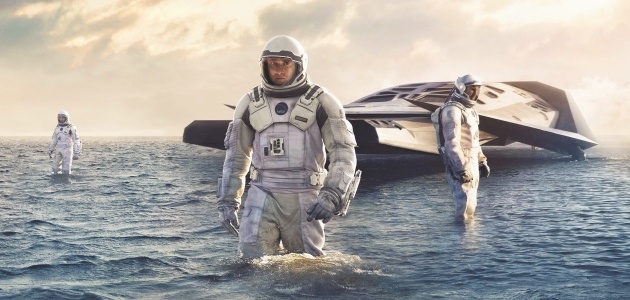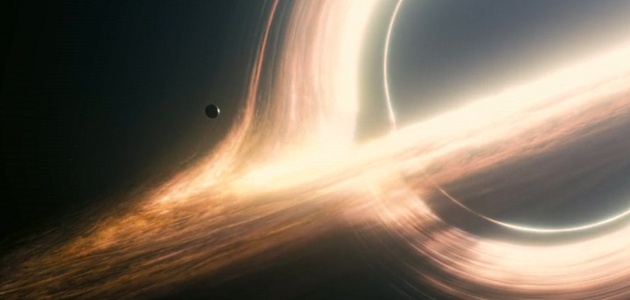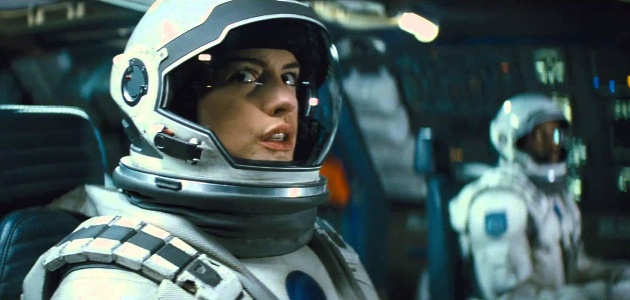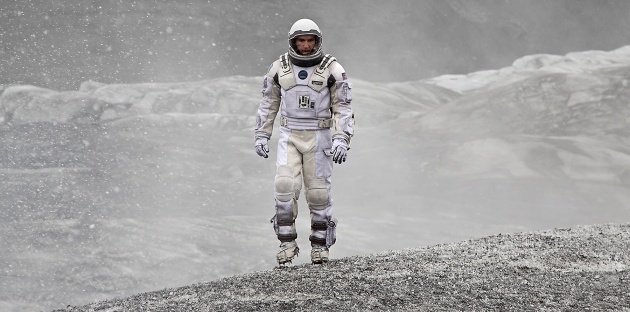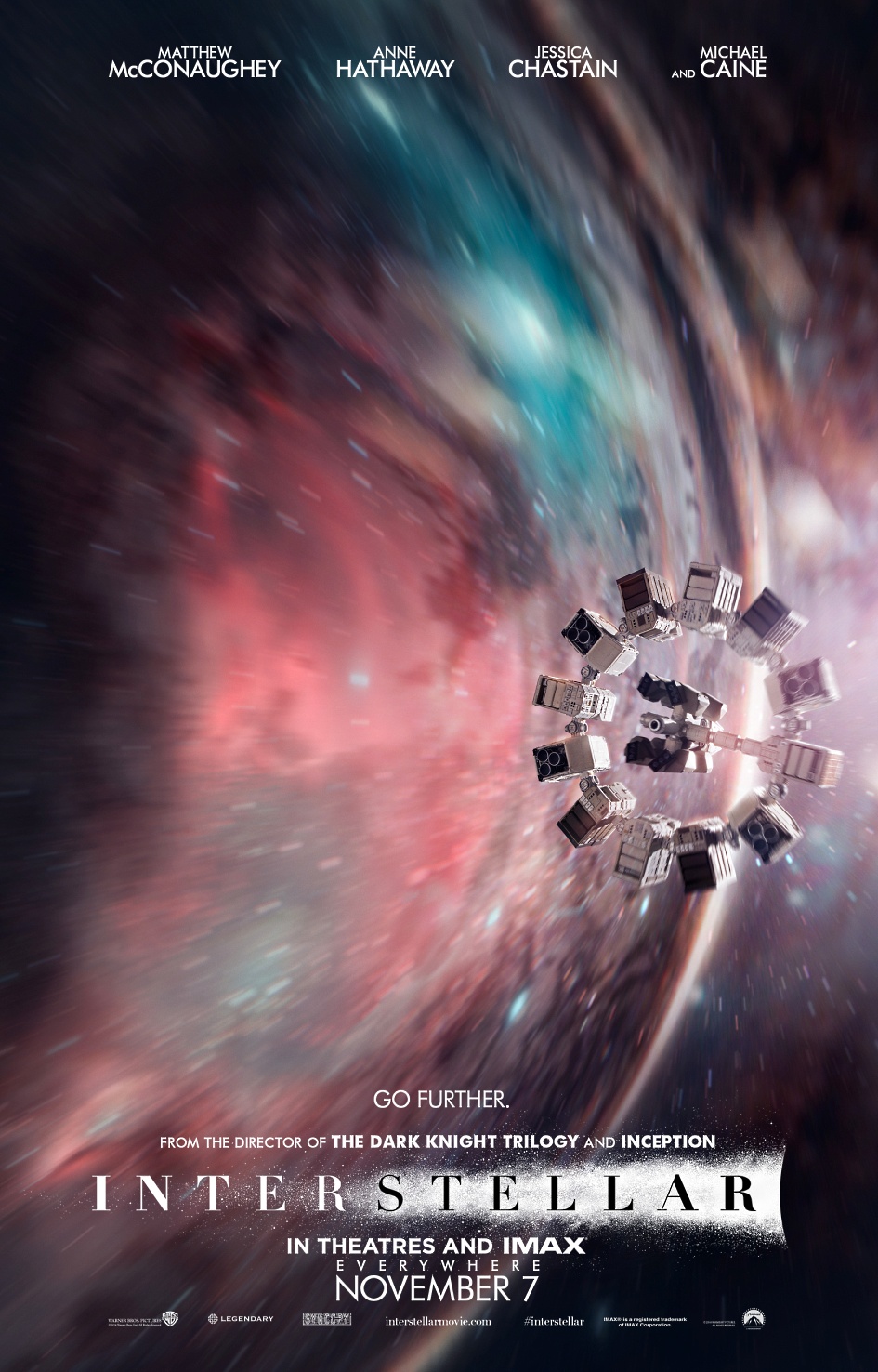By now Christopher Nolan's Interstellar has been orbiting most of the world in wide release for a week, and it sure has left its mark. It's raking in money, although its international haul is noticeably more stellar than its US-based one, and it manages to be a much talked-about film.
Pierce was the first of us to see the film and was floored by it, calling Interstellar "a breathtaking marriage of ambition and heart" in his excellent review.
Looking at opinions on the Internet, his views are not shared by everyone though. Critics and other viewers alike are quite vocal about what they perceive to be the film's stronger and weaker points. Given some of the discussions we've had this week, even us writers here at ScreenAnarchy are pretty divided on the film.
So we had a quick round-up of opinions about the film, and decided to put them here for all to see, in a gallery. The first one up is Pierce again, adding a few words to his review, but click through them all to see our general reception of the film.
Some are elated, some are angry. All are valid in their own way, and so is yours. So please leave your own impression in the comments!
Pierce Conran, Ryland Aldrich, Kwenton Bellette, Jim Tudor, Patryk Czekaj, James Marsh, Jaime Grijalba Gomez, Eric Ortiz Garcia, Sean Smithson and Kurt Halfyard
contributed to this story.












Pierce Conran - Contributing Writer
For me, Interstellar was a thrilling experience and one I was keen to revisit so I saw it again once it was released in Korea, and I took the opportunity to visit the newly opened Lotte Tower multiplex in Seoul, which boasts the world's largest cinema screen as well as ATMOS sound, after having seen the film on IMAX during a press screening.
Despite the mixed (but still quite positive) reception of the film, Interstellar still stands as a bold, breathlessly emotional, and yes, visionary work. One major sequence early on inspired a strong reaction in me (I cried) and I wanted to know if that emotion, not to mention the thrill of certain set pieces would still inspire the same physical reactions on the second go round. To my delight, they did, and this means I'm angling to see it a third time for which I will seek it out in 35mm. Alas the nearest 70mm IMAX is in Taipei, though it is extremely tempting to take a brief holiday!
On a side note, though US returns have been a little soft for the moment, its Korean opening weekend was about twice as well attended and its looking like it will grow this coming weekend. As a combination of spectacle and emotional drama (a key element of most commercial Asian films), Interstellar is an ideal fit for this market.
Please Hollywood, throw more money at original films!
Ryland Aldrich - Festivals Editor
Consider me an unabashed fan of Interstellar.
It's not easy to check all the boxes on a science fiction blockbuster but Nolan and his team knocks this one out of the park. Big ideas: check. Bold execution: check. Full commitment to the premise: check. Many have qualified their praise for the film but I'm all in on the love. From beginning to end I was engaged. And it's particularly important that engagement continued through what could have possibly been (but certainly wasn't) a muddy ending. Final praise should be saved for Hans Zimmer's score. In a film overflowing with technical achievements, this more than anything kept the story connected in a way that was absolutely crucial for the film's success.
Kwenton Bellette - Contributing Writer
As a massive Nolan apologist I was disappointed by the Kubrickian-Spielbergian family-philosophy quagmire that is Interstellar.
Yes, Nolan continues his brilliant preoccupation with the brain - focusing on how time affects it and of course nostalgia, and yes it is a bombastic spectacle, but there was also a significant lack of cohesion.
The film was poorly plotted, the dialogue mostly stilted and the emotional payoffs not even remotely effective. The ending perhaps the biggest slap in the face of all, touted for being epic and ambitious, even brave for Hollywood standards, is in fact as hokey as most semi-intelligent blockbusters.
Jim Tudor - Contributing Writer
Nolan aims far and wide with Interstellar. In its finest moments, its his best work. But in-between the effective payoffs and calculated surprises, Nolan’s desire to bend our minds is borderline aggressive, littered with both heavy-sounding jargon and familiar Earthbound dystopian tropes out of Children of Men, or any number of other survivalist future works. Early comparisons with Kubrick’s 2001 do it few favors, but fact of the matter is that Interstellar nevertheless demands to be seen on the biggest IMAX screen available. Don’t come looking for fast paced action, but rather a ship-load of booming awe. It's a heavy load with everywhere and nowhere to go, and man, does it go there.
Christopher Nolan, while remaining the inescapable Christopher Nolan who’s inadvertently inspired a whole universe of somber popcorn epics, continues to push himself both technically and artistically. For someone who could rest on his laurels and make Batman movies for the rest of his life, his drive to break into new territory, and take us with him, must be admired. That is, even as it insistently drifts, plows, and combines its way through the stars.
Patryk Czekaj - Contributing Writer
I’ve got to admit that during Interstellar’s painfully slow-moving 169 minutes I looked at my watch more times than I can possibly remember. At first I was actually quite impressed with the scope of material Nolan had attempted to tackle here, but once Interstellar leaves the Earth’s atmosphere the intergalactic spectacle becomes almost painful to watch. Only Hans Zimmer’s stunningly beautiful and ethereal soundtrack makes the unnecessarily lengthy sequences more enjoyable.
Unfortunately, for a sci-fi epic that has plenty of scenes full of emotionally resonant gravitas, Interstellar suffers from clunky dialogue and poor character development and is thus far less engaging than it should’ve been. What’s rather ironic is that Interstellar aspires to be such a humane film, and yet it’s clearly TARS who gives the most affecting and hearty performance of all.
Though visually spectacular, Nolan’s over-plotted space odyssey feels very long and drawn out and eventually begins to crumble under the weight of a story it so desperately wants to tell. And then there’s the conclusion. The vital element of the most important equation in humanity’s history is finally revealed. Well, if it’s love that’s supposed to save us than I guess we’re far beyond saving.
I seriously wanted Interstellar to be the biggest hit of this year’s blockbuster season. But for me it’s not. It’s Godzilla. That’s something I never expected to say.
I have seen Christopher Nolan’s Interstellar twice now, both times on digital IMAX (our only option in Hong Kong) and on both occasions I found it to be a fantastic visual spectacle packing a powerful emotional punch. The vast emptiness of space was beautifully realised through the film’s production design, cinematography and one of Hans Zimmer’s most stirring scores in recent memory. The film fulfilled its promise of rocketing audiences to the farthest reaches of the conceivable universe, while keeping its narrative grounded in tangible human drama.
I cried real (manly) tears on three separate occasions the first time I saw the film, and came close to doing so again on repeat viewing. Cooper’s relationship with Murph, the sense of loss, betrayal and regret that coursed through their every encounter was far more powerful and rewarding than any attempt to manifest alien intelligence or textbook-real astro-physics. In fact those criticising the film for its scientific irregularities are missing the objective of the film. Interstellar is Close Encounters of the Third Kind, it is The Abyss, it's Contact. It isn’t Apollo 13.
Many have compared it unfavourably to Kubrick’s 2001: A Space Odyssey, a film obsessed with meticulously recreating the minutiae of a “realistic” space voyage, before very deliberately jettisoning its audience out of the pod bay doors and beyond the infinite, knowingly without any explanation. Interstellar may not be Nolan’s best film, but it is his most ambitious, his most emotional and his most intimate. Does it hold the power to change the world or alter humanity’s perspective of the universe? Of course not, it’s only a movie. But it does have the power to transport you a million light years from home, and have you grasping at every neglected moment of intimacy you’ve ever let slip through your fingers as it does so.
Jaime Grijalba Gomez - Contributing Writer
Right now all I have to say about the movie is that it was tailored to people like me. I'm not a scientist, nor have I ever studied anything related to science, but the issue of black holes, relativity, space exploration and all that jazz has been an obsession to me. I can't handle the big books of relativity theory, but I'm a sucker for any new theory that tries to explain how the universe can work, the possibilities of new galaxies, of the bending of the fourth dimension, and Interstellar’s manages to work some of those themes, and it also manages to get one of my personal favorite themes out there in the final third, and thus makes it my film of the year so far.
I don't care if the science is accurate or not, you can give me a talking black hole and I'll eat it up, and while it's fun, I can handle it, and this is fun (I don't care what other people say) this film had me on the edge of the seat for its last hour or so, specially since the "wave" planet onwards, it was just a nonstop barrage of emotions, great moments and incredible imagery accompanied by some great performances.
Film of the year I say.
Ard Vijn - Contributing Writer
I liked Interstellar, but not as much as I wanted to. While it is well-acted, and looks nice, it nevertheless never really shocked or awed me. Also, comparing this to Nolan's other films, in my opinion he did the simultaneous world-juggling thing better in Inception. I did tear up a little, but ever since I became a father this isn't exactly hard to do if you put parent-child relationships in your film.
Wonky science is not a big issue for me, as great science fiction is about ideas and their impact, and not so much about science fact. Still, I did not expect Nolan to play it this fast and loose. In the end, Interstellar has turned out to be a decent melodrama, with a few great visuals. Its value as science fiction is negligible though, and that disappoints me a little...
Eric Ortiz Garcia - Contributing Writer
The main plot of Interstellar is completely Hollywood (a group of NASA astronauts saving the human race), but it would be innocent to think that Nolan has decided to deliver a conventional adventure flick. Unlike last year’s Gravity, Nolan’s space film is not a visceral experience. There are great visual effects here too, but Gravity was mostly about making us feel the adrenaline of being in deep space; Interstellar explores the possibilities of several physics theories and, at the same time, such human feelings as egoism and love. The core is actually in parenthood, with Matthew McConaughey delivering another terrific performance. It’s an exciting film, and Nolan has achieved masterful moments; it might be his most human film to date, and I really appreciate how he uses things like the theory of relativity to explore the father-daughter and son relationship. Not my favorite Nolan, or my favorite of the year, but it is for sure a worthy journey.
Sean Smithson - Contributing Writer
Don't get me wrong, I love fare like Star Wars, and the recent Guardians of the Galaxy, but it's hard to argue there is an incredible lack of "science" in science-fiction films. Always has been, always will be, most likely. Which is why anytime there's a movie in theaters that even remotely attempts to interject facts into the fantastic, I am overjoyed.
Interstellar is a welcomed addition, in my opinion, to the canon of "rational" sci-fi films, dating back to the work of George Pal in the 1950's, to (obviously) Kubrick's 2001: A Space Odyssey, and Contact (based on the Carl Sagan novel).
The film can't be blindly dismissed, if for any other reason than its depiction of a black hole, which is the soundest, most informed visual representation of the almost intangible phenom ever.
Say what one will about the characters and overall narrative (which I liked), any film that helps make science "sexy" to the masses deserves at least some applause.
Kurt Halfyard - Contributing Writer
The more these women keep getting older, the more Matthew McConaughey stays the same age. Outside of the Batman movies, the bulk of Christopher Nolan's Hollywood career as been focused on the perception of time and self.
Memento is about what time (and truth) might feel like if you were unable to hold on to new memories. The Prestige features two magicians that are split into duplicates, each missing pieces of their own lives, but also how at that moment in time, new technology and old superstition (and showmanship) collided in fascinating ways. Inception explored the temporal dilation of subconscious dream states on the verge of becoming waking ideas.
Interstellar, although it shows a filmmaker whose reach exceeds his grasp more times than not, is about as far as he is going to ever get with the subject at the budgets (and run-time) he now seems to require. As message-y as it seems at times, I was on board with the journey, the nuts and bolts spectacle, and the yes, the parenting drama - both individually in the case of Cooper's aging family, and of the whole darn species, relatively speaking.
Beyond the gravity, space and time, Interstellar feels like a clever pastiche of other cosmic adventures (it makes me pine for a Quentin Tarantino science fiction film, actually.) Drawing obvious - and let's be honest, rather facile - comparisons to Kubrick and Tarkovsky, Nolan is more of a technician than a dreamer and far more populist in how he spins a tale. Better comparison would be Robert Zemeckis’ Contact, or Danny Boyle's Sunshine. The former, insofar as a goodly bit of father-daughter love is capable of transcending death and distance; the latter in that as messy and emotional as us humans can be when making a decision, somehow we’re capable of almost Godlike problem solving abilities given enough necessity.
Murphy's Law is invoked in Interstellar, but really, when Coop has a plan, it works EVERY time, because of necessity. Alright, alright, alright, the man is invincible here, even to being pushed out the door by his daughter on another adventure with not a moment to lose. He's a bootstrap hero who likes to doing everything manually, without a manual.
I'm rambling here, but I'll end on this. One of my favourite quotations from recent science fiction cinema comes from Steven Soderbergh’s shockingly underrated 2002 remake of Solaris. When discussing how mentally equipped mankind is for stellar discovery, the mission-leader pontificates, “We don’t want other worlds, we want mirrors.” That is to say, we go out into space to learn more about ourselves, and 'seeking out new life and civilizations,' is just a happy consequence along the way. The aliens are us, and Nolan gets that, even if he spells it out a little too much for his audience.

More about Interstellar
More about Have Your Say
Around the Internet
Recent Posts
Leading Voices in Global Cinema
- Peter Martin, Dallas, Texas
- Managing Editor
- Andrew Mack, Toronto, Canada
- Editor, News
- Ard Vijn, Rotterdam, The Netherlands
- Editor, Europe
- Benjamin Umstead, Los Angeles, California
- Editor, U.S.
- J Hurtado, Dallas, Texas
- Editor, U.S.
- James Marsh, Hong Kong, China
- Editor, Asia
- Michele "Izzy" Galgana, New England
- Editor, U.S.
- Ryland Aldrich, Los Angeles, California
- Editor, Festivals
- Shelagh Rowan-Legg
- Editor, Canada


